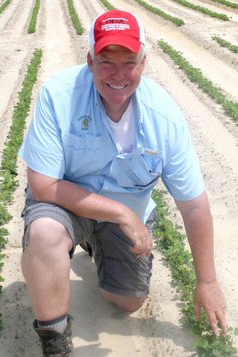From Tifton to Haiti, Kemerait helps peanut farmers
By Sarah Turner
University of Georgia, College of Agricultural and Environmental Sciences

TIFTON — The University of Georgia Tifton Campus is a home away from home for plant pathologist Bob Kemerait.
“Tifton is the heart of agriculture in Georgia, and for row crops, I couldn’t think of a better place to be,” said Kemerait, a professor and Extension specialist at the UGA College of Agriculture and Environmental Sciences.
His job is to educate farmers on the best ways to manage diseases and nematodes on peanuts, cotton, corn and soybeans — four high value crops in Georgia.
Though not raised on a farm, Kemerait became intrigued by the heritage of crops and how they affect the world. Today, he touches the lives of farmers around the globe with his involvement in the Peanut Mycotoxin and Innovation Lab (formerly known as the Peanut Collaborative Research and Support Program). He has worked with indigenous peanut farmers in Guyana, and small-scale farmers in Haiti and the Philippines.
“I enjoy the international work I do, but my heart, primary responsibilities and commitments are right here with Georgia farmers and especially with our county agents,” Kemerait said.
After studying biology at Davidson College and chemistry at the University of Florida, Kemerait concluded plant pathology was a way he could marry his education to his passion for agriculture.
“I was working as a chemist in Gainesville, Fla., and my lab had a window in it. Every day I would look out and say ‘I wish I could do something outside and work with plants and agriculture,’” Kemerait said.
After receiving his Ph.D. in plant pathology, Kemerait joined UGA in 2000 and accepted the job he had always wanted. Being from the South, Kemerait found it especially appealing to be able to research row crops in the same region. However, it was the opportunity for day-to-day communication with growers and county agents that aspired Kemerait to join UGA.
“I was interested in research and teaching, but more than anything I wanted to provide service to the agricultural community as part of my job,” Kemerait said.
To provide timely, research-based information to growers and county agents, Kemerait develops presentations, Extension bulletins, newsletters and online articles. He also takes field calls to diagnose problems for county agents.
Kemerait’s research focuses on peanut pathogens, fungal diseases of corn, nematodes affecting cotton, soybeans, corn and Aspergillus flavus, a fungus that produces aflatoxin which is a significant concern in peanut and corn production both in the U.S. and in tropical areas around the world.
“I tremendously enjoy having a job where I can work in the diagnostic lab, work with graduate students, and I can also work out in the field as much as I want to. That’s very exciting,” Kemerait said. “Hopefully my work has made it possible for growers to stay in business to one degree or the other and to make better progress and become better at what they do.”
Published June 14, 2014
